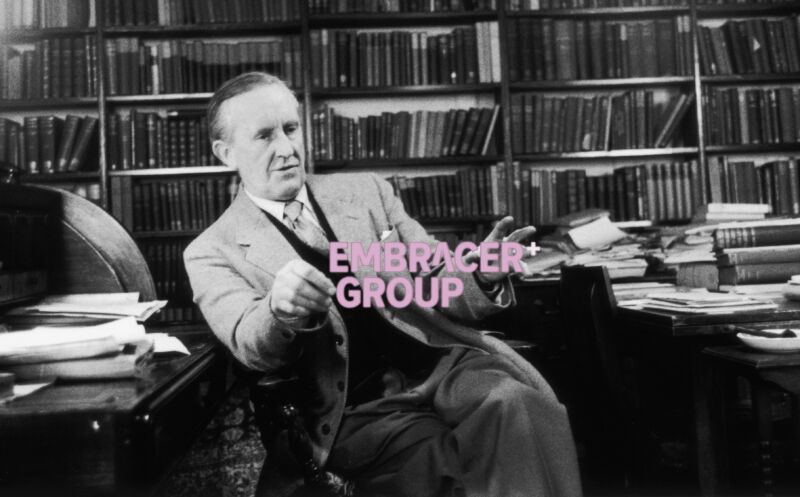
Swedish game publisher Embracer Group has racked up headlines in the past few years thanks to megaton acquisitions of video game studios, and on Thursday morning, the company announced it has grown further still. Its latest acquisition spree includes one surprising company outside its usual business purview: Middle-earth Enterprises.
This company is better known as the exclusive handler of all Lord of the Rings and Hobbit novels, along with all intellectual property derived directly from those J.R.R. Tolkien fantasy masterworks. The financial terms of this deal with previous handler the Saul Zaentz Company were not disclosed, but Embracer is already eager to tease brand-new films featuring the aforementioned novels’ characters.
No production plans have been set for new films just yet; rather, Embracer says in a press release that it wants to “explore additional movies based on iconic characters such as Gandalf, Aragorn, Gollum, Galadriel, Eowyn, and other characters from the literary works of J.R.R. Tolkien.” The deal has a logical connection to Embracer’s existing business in the form of LOTR-themed board games already being produced by its subsidiary, Asmodee, while it’s hard to imagine Embracer not immediately assigning one of its many wholly owned video game studios to the franchise in one way or another. Embracer has yet to suggest plans to produce a Tolkien-themed video game, however. Instead, its Thursday announcement hinted to “new opportunities for fans to explore this fictive world through merchandising and other experiences.”
Importantly, this deal does not materially affect Amazon’s upcoming, highly budgeted Rings of Power TV series. That series’ pitch was led directly by the Tolkien estate and presented to various platforms before Amazon emerged with a winning bid, and the deal cleverly sneaked past Middle-earth Enterprises’ rights, because it involved texts and materials not covered by the long-standing SZC arrangement. Embracer suggests it “has financial interests” in the Amazon series, but it’s unclear whether Embracer will see any cut of that production’s profits, or if they merely benefit from more publicity and attention to all things Tolkien.
That’s a lot of Embracin’
Embracer named six other companies as acquisition targets, with four resembling traditional game development houses: Tripwire Interactive, the American studio responsible for the Killing Floor and Maneater series; Tuxedo Labs, a Swedish studio best known for the PC-exclusive destruction-simulation game Teardown; Tatsujin, a Japanese developer staffed by arcade-era developers with plans to work on series from the esteemed Toaplan games library (particularly the classic “shmup” Truxton and the beloved meme machine that is Zero Wing); and Bitwave Games, another Swedish studio with plans to both collaborate with Tatsujin and also create ports of NES-era classics like Sunsoft’s lost 8-bit gem Gimmick. The latter announcement appears to spoil at least one news item from a Sunsoft-related event scheduled for later on Thursday.
Outside of formal game studios, Embracer’s three other named acquisitions seem designed to diversify the company’s gaming business portfolio. The best-known of these, Limited Run Games, has risen to prominence among gaming fans in the past five years thanks to its focus on physical game releases. Typically, Limited Run opens up preorders for cartridges and discs of games that have previously launched as digital-download exclusives; once the preorder period completes, the publisher typically shuts down orders for the game in question, especially since the games in question are often cult classics or niche favorites (though it occasionally publishes games from larger game studios, particularly certain versions of games in the Doom series). Embracer did not suggest in its acquisition announcement that it plans to shift Limited Run’s business model.
Embracer is additionally acquiring Singtrix, a karaoke system manufacturer launched by patent holders previously involved in the Guitar Hero series. That acquisition’s announcement does little to clarify what consumers might expect from an Embracer-run Singtrix, other than a suggestion that the company is working on “the next pop culture musical experience,” which may or may not involve a future video game-like project. There’s a chance that Embracer’s third non-studio acquisition, the European peripheral manufacturer Gioteck, could help Embracer build some kind of physical musical peripheral to go with whatever Singtrix is whipping up, but that’s only speculation at this point.
In addition to all of these announcements, Embracer buried news of another game studio acquisition that it is not prepared to announce “due to commercial reasons.” Instead, Embracer suggested that this unnamed studio counts as “the third- or fourth-largest” game studio it entered plans to acquire today—which suggests that it’s not necessarily a massive studio. (If this were the third- or fourth-largest acquisition in the company’s entire history, on the other hand, that would be worth no less than $525 million, which is what it paid for the entirety of Saber Interactive in early 2020.)
Thursday’s news follows the shocking May announcement that Embracer had acquired the entire Western operations of Square-Enix, and those studios’ lucrative IP (including the Tomb Raider, Legacy of Kain, and Deus Ex series), for a mere $300 million. That announcement included confirmation that the studios were moving ahead with games in both the Tomb Raider and Deus Ex series, though neither Embracer nor its newly owned studios have revealed anything more about such games since the May news broke. That followed its acquisitions of well-known game studios such as Gearbox Entertainment (Borderlands), 4A Games (Metro Exodus), and Deep Silver Volition (Saint’s Row, Red Faction). https://arstechnica.com/?p=1874477

